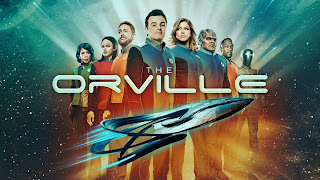The Orville (Thursdays at 9:00 on Fox)
The last time Fox attempted to resurrect the sci-fi drama/space opera genre popularized by the Star Trek series, we got a brilliant, witty, oddball mix of genres that failed to attract an audience of live viewers and was canceled after three months on the air.
The year was 2002, and the show was Firefly.
Now, fifteen years later, Fox is trying again with Seth MacFarlane's The Orville. And while this newest space exploration series isn't blending genres in the way Firefly did, a major criticism the show faced upon its premiere, The Orville is blending comedic with dramatic tones in a way that may similarly put casual viewers off it the same way Whedon's show did previously.
When it was first announced and previewed, The Orville appeared to be a Star Trek parody more in the vein of MacFarlane's film A Million Ways to Die in the West than a show that should be taken seriously by sci-fi fans. What the show actually is, though, is a loving homage to Star Trek, its creators, and its fans.
I have to admit, that's not me. I've never seen a single episode of any Star Trek franchise, and I slept through the 2009 J.J. Abrams film. So I went into The Orville expecting a send-up of the beloved property. It was a logical expectation, considering MacFarlane's pedigree (Family Guy, American Dad!, The Cleveland Show, Ted). But The Orville is more like his producing credit on the modern-day Cosmos: a serious attempt at recreating the magic of a show MacFarlane appreciates and respects. The weird thing? He's mostly successful.
MacFarlane serves not only as the creator, producer, and a writer and director of The Orville, he also portrays Ed Mercer, a divorced mess of a man who, after years of waiting and working, is finally offered the chance to captain an exploratory space vessel 450 years in the future. He staffs his ship with his egotistical and unpredictable best friend Gordon (Scott Grimes, Steve's voice on American Dad!) at the helm; a stoic single-gender alien (Peter Macon) as second officer; Dr. Claire Finn (Star Trek: Deep Space Nine's Penny Johnson Jerald), a molecular surgeon, heading up the medical sector; a young alien with super strength (Halston Sage) as Chief of Security; and, against his wishes, his ex-wife Kelly (Adrianne Palicki, Agents of SHIELD) as first officer. The crew makes their way through deep space, keeping evil alien races from stealing technology, saving others from capture, and, of course, dealing with their own personal dramas.
The thing that is least successful about The Orville is its uneven tone and quick shifts between silliness and seriousness. The second episode, for example, opens with Bortus asking for 21 days of leave to gestate an egg he's laid, leading to a goofy conversation about where the egg comes out of his body in a single-gender species (it's decided by Gordon and navigator John LaMarr that it must come from his butt). Then we get an entire conversation between Mercer and his parents about colon health, so it's a very ass-centric beginning to the episode and what many would expect from MacFarlane. However, the plot soon veers into serious territory when it becomes a story of human trafficking when Ed and Kelly are kidnapped and put on display in a zoo. They are forced to live together in a replica of their former apartment (and their former lives), opening old wounds and re-airing old grievances. It's jarring and not entirely convincing. To constantly oscillate between comedy and drama, from images of a giant, masculine alien sitting naked on an egg to images of children held in captivity, the tone becomes confused.
For Trekkies, though, The Orville will be a goldmine. Even I, who has barely any familiarity with the franchise, can recognize the tributes here. Bortus's physical design is very similar to both Klingons and Freegans. The Orville, itself, is a physical model rather than CGI, giving the overall look of the space traveling scenes a throwback feel. According to one Star Trek fan I've talked to, the opening credits are nearly a shot-by-shot recreation of those from Voyager. So the weird tonal shifts make a little more sense if The Orville is watched not as just its own thing but as an homage to Star Trek that aims to recreate its themes of unity and optimism and an homage to its fans as well. That confused, unbalanced tone is the point. This isn't a show that's about parodying sci-fi or writing poop jokes in space or presenting a wholly dramatic view of an apocalyptic future. It's all of it. It's honoring the inherent cheesiness of the Star Trek universe while also bringing its optimism to a television landscape that's sorely lacking in that. It's telling melodramatic stories, addressing serious issues, and also showing us an alien's naked ass as he hatches an egg. The mix of tones and emotions is intentional, and it may not be for everyone... but when you watch it for what it is and everything gels into something messy, weird, and offbeat, The Orville can be a lot of fun.

Comments
Post a Comment